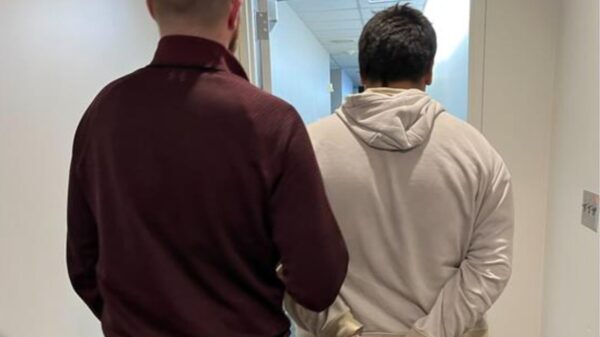A new COVID-19 variant, known as Stratus, is spreading rapidly across the globe, characterized by an unusual early symptom that distinguishes it from other strains. First identified in Southeast Asia in January 2025, Stratus has since made its way to the United States, where it became the dominant strain by September 2025.
The strain appears in two forms, labeled XFG and XFG.3. The World Health Organization (WHO) included XFG on its monitoring list by June due to its swift global transmission capabilities. Unlike typical COVID-19 symptoms that resemble those of other respiratory infections—such as fever, cough, and runny nose—Stratus is marked by a hoarse or raspy voice, often appearing before more common symptoms.
Medical professionals have noted additional symptoms associated with this variant, including sore throats, nasal congestion, digestive issues, and severe fatigue. Dr. Gareth Nye, a health expert from the University of Salford, highlighted the differences in symptomatology, stating, “In most ways, it’s almost identical. However, people with this version tend to get very sore throats and a hoarse voice, compared with the other more general symptoms like cough, temperature, and aches.”
The surge of the Stratus variant in the U.S. coincided with the summer of 2025, coinciding with the return of children to school, where close contact often increases the spread of illness. Dr. Nye pointed out that schools typically see spikes in illnesses as children gather, noting, “Illnesses always see spikes as children go back to school, as close contact and often lower personal hygiene levels mix.”
As Stratus spreads, it exhibits the ability to partially evade the immune system, which raises concerns about the effectiveness of previous vaccines. Dr. Peter Chin-Hong from the University of California, San Francisco, cautioned that this variant presents a broader range of symptoms compared to earlier strains. He indicated that older adults, particularly those who did not receive vaccinations last year, may experience more pronounced sore throats.
“There’s a little bit more sore throats with some people, particularly older adults who didn’t get vaccinated last year,” Dr. Chin-Hong noted. He added, “It’s more transmissible, so we expect that a lot of people will get it. Particularly with kids going back to school, a sniffle is likely going to be Covid.”
The WHO has assured the public that currently approved COVID-19 vaccines are expected to remain effective against severe illness caused by Stratus. By September 2025, the variant was estimated to account for approximately 85% of COVID-19 cases in the U.S., with wastewater analysis confirming its prevalence.
Despite the emergence of Stratus, health officials emphasize that the mutation of viruses is a normal phenomenon. The UK government noted, “It’s normal for viruses to mutate and change, and as more data becomes available on these variants, we’ll have a better understanding of how they interact with our immune systems and how to optimize our protection.”
Officials continue to stress the importance of vaccinations, stating, “The most important thing is for those eligible to get their vaccination when it is due.” As the situation evolves, public health agencies are working diligently to gather data to inform the best strategies for managing the new variant and protecting vulnerable populations.







































































